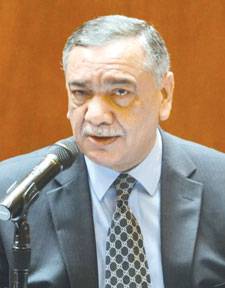ISLAMABAD - Chief Justice of Pakistan Asif Saeed Khan Khosa has said that taking any action against Justice Faez Isa was solely the prerogative of the Supreme Judicial Council and government has no authority to remove a judge of the superior judiciary.
The chief justice, who reached London the other day and addressed a conference at Cambridge University on Sunday, said this in response to questions about the matter – which has gained huge political significance in Pakistan.
CJP Khosa, who also heads the Supreme Judicial Council (SJC), asked the people of Pakistan to show faith in the judiciary and assured them of a fair trial and upholding the rule of law in the proceedings, reported ARY News.
The government last week had filed references against Supreme Court judge Qazi Faiz Isa and Sindh High Court judge Karim Khan Agha in the SJC alleging that they had not declared all assets of their children and spouses, inviting a strong and massive reaction from country’s legal fraternity.
On Sunday however, differences emerged in the ranks of legal fraternity over filing of reference against the judges, and a relatively less significant forum of lawyers demanded the Pakistan Bar Council (PBC) to withdraw its call for strike.
The PBC – the apex regulatory body of lawyers – had issued a call for a countrywide strike in support of Justise Isa on June 14, the day when the SJC will take up the reference against him.
The regional bar councils across the country also held a joint meeting on Saturday and urged the government to withdraw a reference filed against Justice Karim Agha of SHC.
The representatives of these bodies see a mala fide intention behind these cases against the judges, especially Justice Faiz Isa. They believe it to be a conspiracy hatched by the government on establishment’s bidding to subdue the judiciary.
But on Sunday, an All Pakistan Lawyers Representative Convention, held under the aegis of Lawyers Action Committee in Islamabad, threw its weight behind the government and the SJC and urged the council to decide the references as soon as possible on merit in the light of the law of the land.
The lawyers’ convention passed a unanimous resolution backing President Dr Arif Alvi’s forwarding the references against the judges and opposing PBC’s demand for resignation of Law Minister Barrister Farogh Nasim and Attorney General of Pakistan (AGP) Anwar Mansoor Khan.
The resolution stated that President Alvi sent the references against the judges by fulfilling his constitutional and legal responsibility as per law and the constitution.
It demanded the SJC to decide the reference on merit, as per law and the constitution. It added that it is the old demand of PBC, Supreme Court Bar Association, provincial bar councils and other bar associations that SJC should conduct accountability of judges and it should decide all the references against judges on the merit and at the earliest.
The resolution further said that in this connection, various resolutions of PBC, Supreme Court Bar Association, provincial bar councils and other bar associations are on the record and therefore, the resolution of PBC dated June 8 had negated the previously passed resolutions about accountability for all.
The lawyers convention strongly condemned the resolution of PBC regarding call for strike on June 14 saying that no judge or other office holders is above from the law and constitution. It urged the SJC to decide all references against the judges without any pressure so that rule of law could prevail in the country. It said that the lawyers stand by the SJC in this regard.
The lawyers, in the resolution, also condemned the people who were threatening judges or members of the SJC and said that they would not tolerate any act that harms the respect and dignity of the SJC and the other constitutional institutions.






